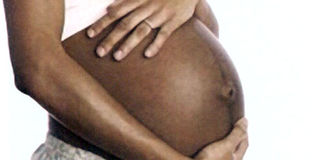What comes with the different trimesters?

What you need to know:
Different things come with the different stages of pregnancy and there are things you ought to do and those that you need to avoid at each stage. Dr Henry Bukenya, a general practitioner at Mulago Hospital, advises that the moment you discover that you are pregnant, add 250 calories to your daily diet to provide nourishment for the developing foetus.
At first, the periods take forever to come and just as you start to think of what could be wrong, morning sickness sets in, you start vomiting and feeling nauseated.
Then you can’t work as much as you used to because you are frequently feeling tired and at one moment, you want to eat mangoes, gonja, ice cream… and just as the husband returns from Ggaba at 11p.m. and has gotten you the deep-fried fish you asked for, you start feeling like eating fresh fish, cannot stand seeing your neighbour and before you know it, that beautiful skirt does not fit anymore.
Different things come with the different stages of pregnancy and there are things you ought to do and those that you need to avoid at each stage. Dr Henry Bukenya, a general practitioner at Mulago Hospital, advises that the moment you discover that you are pregnant, add 250 calories to your daily diet to provide nourishment for the developing foetus.
The food should include items with high fibre, sugar-free cereal, iodised salt and a lot of fruits and vegetables. You should then go for a physical examination that will include; checking the blood pressure, the neck for hormones needed when pregnant that help with the diet, the breasts, abdomen, STDs, and HIV. You should also be screened for Rhesus factor (RH), an anti body that indicates if the child may have sickle cells. It is also then that the date of delivery will be estimated.
During the first trimester (1st to 12th week) the expecting mother will experience nausea, vomiting, morning sickness, loss of appetite, mood swings, headache, excessive salivation and craving for certain foods.
Dr Bukenya says, “Mothers should avoid X-rays during this period because the foetus is very sensitive to the harmful effects of radiation like infrared. An expecting mother in her first trimester should only go for an X-ray under unavoidable circumstances, like if she has been involved in an accident and needs to establish if she has been hurt or not, and even then, a protective lead field garment has to be placed around the lower abdomen to protect the uterus.”
During the 6th week, the mother should start regulating her activities. For example if you have been working 12 hours, start working for eight hours. And at this stage, you should start exercising everyday for 30 to 40 minutes. The second trimester (12th to 24th week) may come with heartburn (which can be minimised by eating small meals from time to time and avoid bending or lying flat immediately after eating), frequent tiredness, occasional abdominal pain extending to the back. At this stage, the foetus is most exposed to anaemia so the mother should increase her intake of foods with iron supplements and folic acid.
The level of the alpha feto protein should also be measured. If it is too much, then the mother may either be having more than one baby or the baby may be born with spina bifida, a congenital abnormality of the spine which appears like a small round swelling at the back. Dr Bukenya says that when they discover that the alpha feto protein is high, they try to help the foetus by injecting an inverse hormone that will reverse the concentration and the baby can easily be delivered. However, nothing can be done if there’s more than one foetus. And when the alpha feto protein is low, there will be a chronzone imbalance. The baby will most likely be born with sexual abnormalities and may be impotent or infertile.
During this stage, it is determined if the mother is having ectopic pregnancy (if the baby is growing in the fallopian tube) or not and Dr Bukenya says that if this happens, it is advisable to terminate the pregnancy or the mother and baby may not survive. The third trimester (24th to 36th week) comes with increased virginal discharge which is normal unless it has a foul smell, which means you need to go for a check up to rule out candidiasis and trichomonas vaginosis.
Expectant mothers should note that if you get a false alarm (labour) and try to push, you may develop Haemorrhoids (Piles) which appear at the anal region and are very painful. They can be relieved by taking stool softeners like enema, anaesthetic gel or anusol ointment. This period also consists of swelling of the feet and the areas around the virginal opening and elbows, but this is not painful. For this reason, clothing around the legs and waist should be loose. The mother should ideally rest on the left side with the legs up for about 30 minutes three or four times a day.
Throughout the pregnancy, sexual intercourse is allowed but must be stopped in case of vaginal bleeding, pain or leaking of amniotic fluids. Dr Bukenya says that mothers should avoid oral sex in pregnancy because air can enter the uterus through the vagina and when it does, the foetus will be badly affected. The physical and emotional changes may make you uncomfortable at first but you should be happy you are pregnant because it does not happen to everyone. So embrace your new body and enjoy it as it changes.




